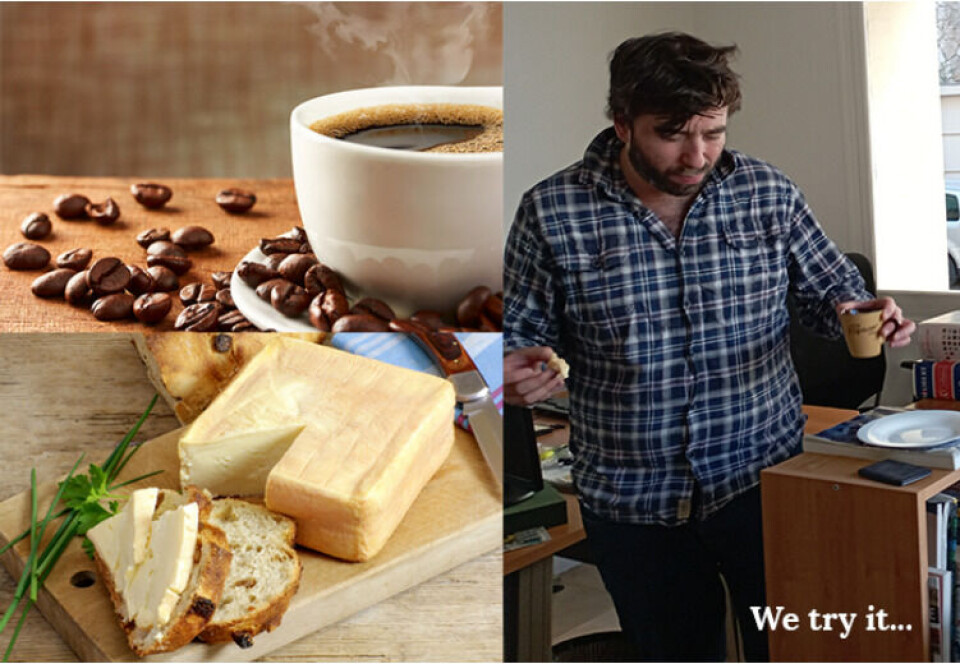-
Three fun fromage phrases for France’s national cheese day
Today (Thursday, March 27) is la journée nationale du fromage
-
Know your cheeses and their seasons: which to eat in France in March
Goat’s cheese makes a strong return as spring leads to fresh produce
-
Know your cheeses and their seasons: which to eat in France in February
Cow’s milk cheeses dominate as winter comes to an end
North France: Is cheese really dunked in coffee at breakfast?
We try it (better than expected) and talk to representatives of the village from where the strong-smelling Maroilles cheese originates

A northern French tradition involving dipping 45-50% fat Maroilles cheese in a cup of coffee at breakfast is not as popular as it once was but is still done, residents of Maroilles village (Nord) told The Connexion.
Maroilles is considered one of France’s strongest cheeses and was the focus of a recent competition during the 55th Foire du fromage in La Capelle (Aisne), where people competed to wolf down the largest amount of it. Coffee dipping was optional.
The winner ate 1 kilo and 26 grams of the cheese in 20 minutes.
While the Maroilles residents interviewed by The Connexion said they knew of friends and acquaintances who continue the custom, in general it seems to have gradually lost popularity since the 1920s and 1930s.
“When I arrived in Maroilles over 40 years ago, I knew some elderly people still did it, but the tradition never quite passed on to younger generations when they died,” said Hervé Gournay, president of the Maroilles village’s history society.
The custom enjoyed a national boost in popularity, however, with Bienvenue Chez Les Ch’tis (Welcome to the Sticks in English), a 2008 film which attracted 20.4 million viewers in French cinemas and which shows the tradition in practice.
Read also: Why some French cheese may begin to taste a bit different
The tradition of taking it with a morning coffee dates back several centuries to when farmers needed to take in a lot of calories early in the day in order to sustain themselves during their 10 or 12-hour shifts, during which they would most likely not return to the farmhouse to eat.
Maroilles cheese can be spread on toast and is usually eaten cold when dipped. However, French people also heat it to ‘dull’ its strong taste. While it does not appear on regular lists of France’s smelliest cheeses, its odour is well known.
Dipping Maroilles in coffee is one of several historic food and drink traditions from the Hauts-de-France region. Others include pouring candi sugar or spirits into coffee, said Mr Gournay.
Mr Gournay said people from Lille (Nord) to Strasbourg (Bas-Rhin) would usually dip local cheeses in their coffee, often containing added chicory.
While some miners and factory workers also shared the custom, it was not that well-established within either sphere, as Maroilles is expensive because of the large quantity of milk needed to produce its 45-50% fat content.
“It is getting more and more rare,” said Bruno Rybezynski, owner of the Brasserie Saint-Humbert in Maroilles, adding that he has never seen anyone in his establishment following the tradition, nor does he offer it on the menu.
But the custom could come back, as Mr Gournay has plans for its reintroduction.
“I want to offer people a slice of Maroilles with a coffee as part of a trail of culinary customs from around the region for the Journées du Patrimoine in 2023,” he said.
“We will let people choose whether they want to dip it,” he added.
So what’s it like?
Three members of The Connexion team volunteered to try it out this morning and the verdict was that the cheese was super creamy and good on bread but that the coffee does not add much value to it.
We were, however, surprised to all agree that it was nicer than it may suggest (and smell) at first glance / sniff.
We dipped the cheese directly into our coffees while Dany Boon in Welcome to the Sticks dipa maroilles toasted on bread saying it “softens the strong taste.”
Read more
Camembert losing out in battle for France’s favourite cheeses
French supermarkets recall cheese containing undeclared allergens
























